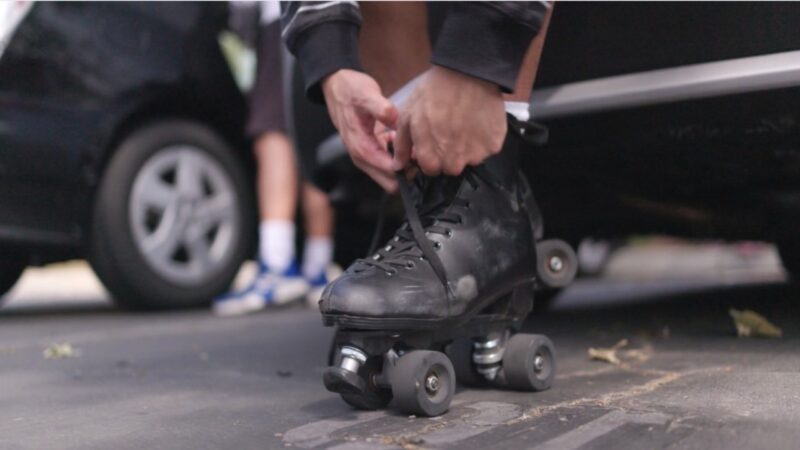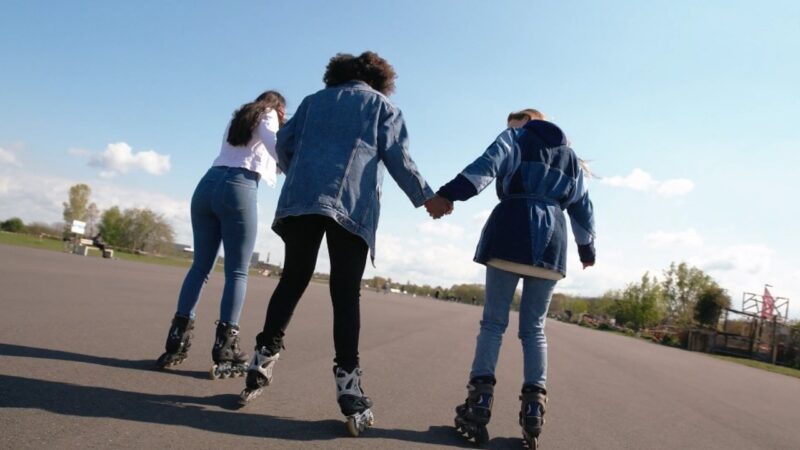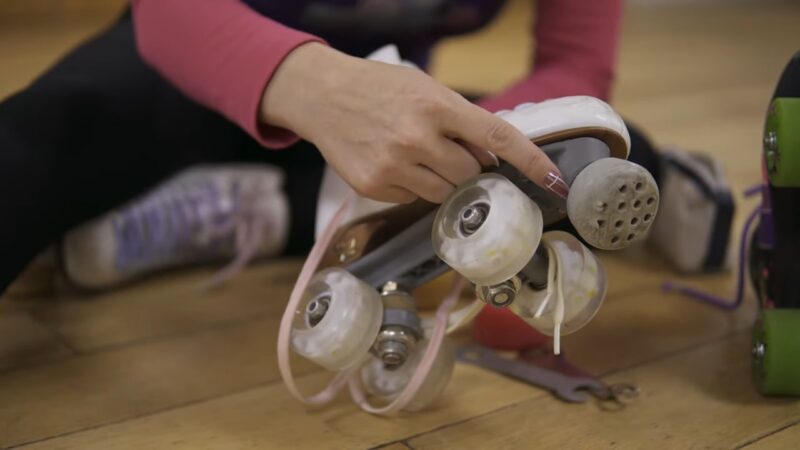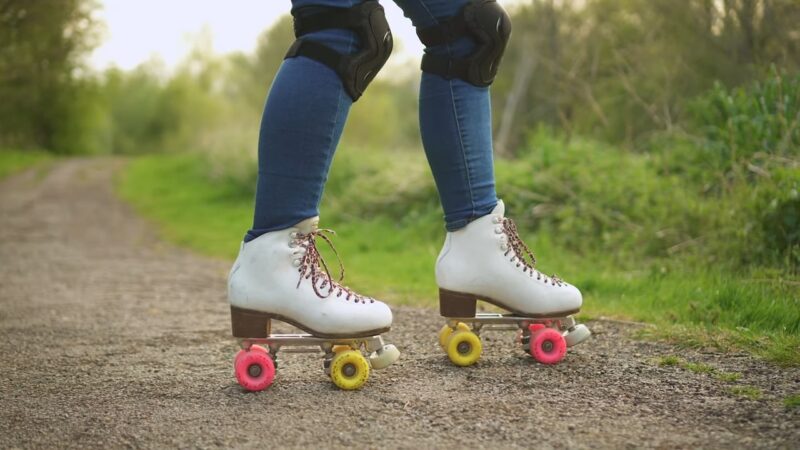Welcome to a new chapter in your life where age is nothing but a number. You’ve reached the fabulous 40s, a stage where experience merges with enthusiasm to explore new horizons. Are you considering taking up a new hobby, like roller skating? If you’re questioning whether you can learn to roller skate at 40, the answer is a resounding YES!
Age is not a barrier to acquiring this fun-filled skill. This guide will navigate you through the process and benefits of learning to roller skate, no matter your age.
Skating Basics
Starting your roller skating journey begins with understanding the basics. Like any other physical activity, there’s a learning curve, but with persistence, you can confidently glide and swerve on your roller skates in no time.
- Choosing Your Skates: Skates come in different styles, including quads (four wheels set up in a two-by-two configuration) and inlines (four wheels in a straight line). For beginners, quad skates offer more stability, while inline skates require more balance but offer better maneuverability. Your choice depends on your comfort level, but don’t worry about sticking to one type forever. As you gain confidence and skill, you can always switch.
- Safety Gear: Safety should be a priority, especially for beginners. Purchase a good quality safety roller skating wear, helmet, wrist guards, elbow pads, and knee pads. These will cushion you during falls and help prevent injuries.
- Learning to Fall: Falling is an integral part of the learning process. The key is to learn how to fall correctly, so as to minimize any potential injuries. Practice falling on a soft surface by bending your knees, leaning forward, and allowing yourself to fall sideways.
- The First Steps: Find a smooth, flat surface to start practicing. An empty parking lot or a quiet neighborhood street can be great options. Begin by marching in place, then start to march forward. Once you’re comfortable, graduate to rolling and steering.
Benefits of Roller Skating at 40 and Beyond
There’s more to roller skating than meets the eye. Apart from the thrill of the wind in your face and the joy of learning a new skill, roller skating offers numerous health benefits, particularly important as we age.
- Physical Fitness: Roller skating is a comprehensive workout that targets almost every muscle group in your body. It engages your core, improves balance, and strengthens your legs. It’s an effective cardiovascular workout that boosts heart health. Moreover, it aids in weight management, as it can burn up to 600 calories per hour.
- Mental Wellness: Roller skating isn’t just beneficial to the body, but also to the mind. The concentration required in skating provides a great distraction from everyday stressors. Additionally, the physical activity releases endorphins, the body’s natural mood boosters, thereby reducing anxiety and depression.
- Socializing Opportunities: Roller skating is a social sport. Whether you join a local skating club or just skate in your neighborhood park, you’ll likely meet fellow skaters, leading to new friendships and a sense of community.
Tips to Keep Going

The key to mastering roller skating, like any new skill, lies in perseverance. Here are some tips to keep you motivated on your roller-skating journey:
- Consistent Practice: The more you practice, the better you’ll become. Start with short, regular sessions, gradually increasing your time as your stamina improves.
- Set Goals: Having clear, achievable goals can significantly boost your motivation. Start with simple goals, like maintaining balance for a certain amount of time, and gradually move to more complex ones, like mastering a specific move.
- Take Breaks: Don’t push yourself too hard. While regular practice is key, it’s equally important to rest and let your body recover.
- Learn from Mistakes: Remember, every fall is a step closer to success. Use your mistakes as learning opportunities.
- Seek Professional Help: Consider getting a coach or joining a skating class. Having professional guidance can accelerate your learning and ensure you’re skating correctly and safely.
Ageless Joy
Roller skating is more than just a physical activity; it’s an experience that takes you back to your carefree, youthful days. Skating around, feeling the wind against your face, and the thrill of cruising on wheels can bring out a sense of joy that’s both liberating and rejuvenating.
Yes, there may be initial hiccups, and yes, there will be challenges. But the feeling of accomplishment as you cruise around the park or even your backyard is immeasurable. The journey of learning to roller skate at 40 is not merely about mastering a new skill. It’s about proving to yourself that age is not a determinant of capability, but merely a number. It’s about embracing new experiences and enjoying every moment.
As the saying goes, “Life begins at 40.” So why not lace up those skates and embark on this exciting journey of self-discovery, health, and happiness? Roller skating is proof that at any age, life can, and should, be an exciting ride. So, strap on those pads, put on your helmet, and let the good times roll!
FAQs

Is it too late to learn roller skating at 40?
No, it’s never too late to learn roller skating. Age is not a barrier to learning new skills. With the right mindset, safety precautions, and consistent practice, you can learn and enjoy roller skating at any age, including at 40 and beyond.
What kind of roller skates are best for beginners over 40?
For beginners, particularly adults, quad skates (four wheels set up in a two-by-two configuration) are usually recommended because they provide more stability, which can help you gain confidence while learning the basics. As you become more comfortable, you can switch to inline skates if you desire.
Are there any health benefits to roller skating for those in their 40s and older?
Yes, there are numerous health benefits to roller skating. It offers a comprehensive workout, engaging your core, improving balance, and strengthening your legs. It’s also an effective cardiovascular activity that can improve heart health. Besides physical benefits, roller skating also aids mental wellness by reducing stress and anxiety.
What safety precautions should I take as a beginner in roller skating?
Safety should be your priority when starting to roller skate. Purchase a good quality helmet, wrist guards, elbow pads, and knee pads. These items will cushion you during falls and help prevent injuries. In addition, learning how to fall correctly can minimize the risk of serious injuries.
How often should I practice roller skating to make progress?
Consistent practice is key to improving your roller-skating skills. Start with short, regular sessions and gradually increase your time as your comfort and stamina improve. However, also remember to give your body adequate rest and recovery time.
What can I do to stay motivated while learning to roller skate?
Setting clear, achievable goals can help keep you motivated. Celebrate your small victories along the way – such as maintaining your balance for a longer period, or skating a certain distance. Consider joining a roller-skating community or group where you can share experiences and learn from others. And remember, every fall is a learning opportunity, not a setback.
Conclusion

In essence, your foray into roller skating in your 40s (or beyond) is a testament to your zest for life. This fun-filled, energetic activity not only delivers an effective full-body workout, but also infuses your daily routine with joy, relaxation, and the spirit of childhood nostalgia. Age, as they say, is no barrier to the spirit of adventure, learning, and growth.
Roller skating offers the perfect blend of fun, fitness, and mental well-being, all wrapped into one exciting package. It allows you to step outside your comfort zone, foster new friendships, and most importantly, continue learning and growing.
The road may seem daunting at first, with your first few stumbles and falls, but remember, every great skater has fallen a time or two. It’s the getting back up and trying again that leads to mastery and enjoyment.
As you embark on this thrilling journey, you’ll discover that roller skating isn’t just a pastime, it’s a lifestyle – a rejuvenating adventure that beckons you with open arms, irrespective of your age. So, as you roll into this new chapter of life, remember to soak in every moment, cherish every glide, and embrace every fall, because each is a part of this remarkable journey. As you lace up those skates and take that first brave stride, remember – you’re not just skating; you’re celebrating the beautiful rhythm of life at 40 and beyond!
